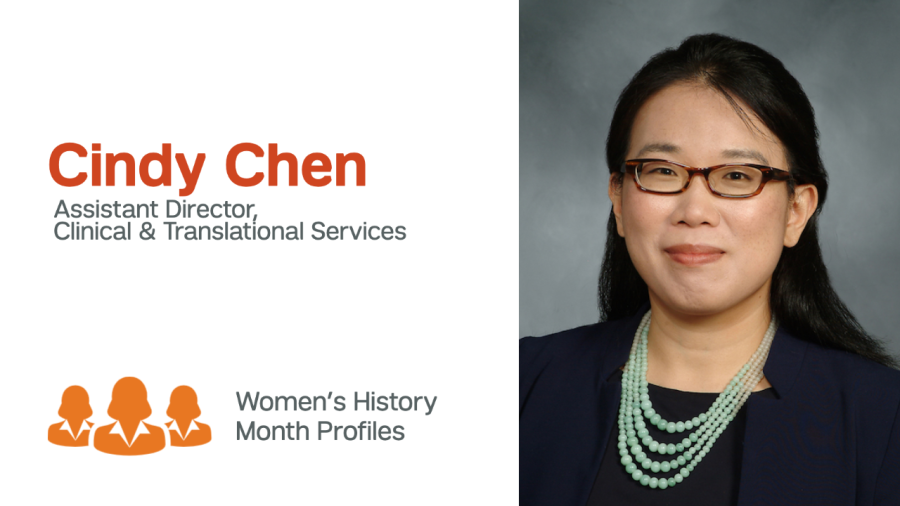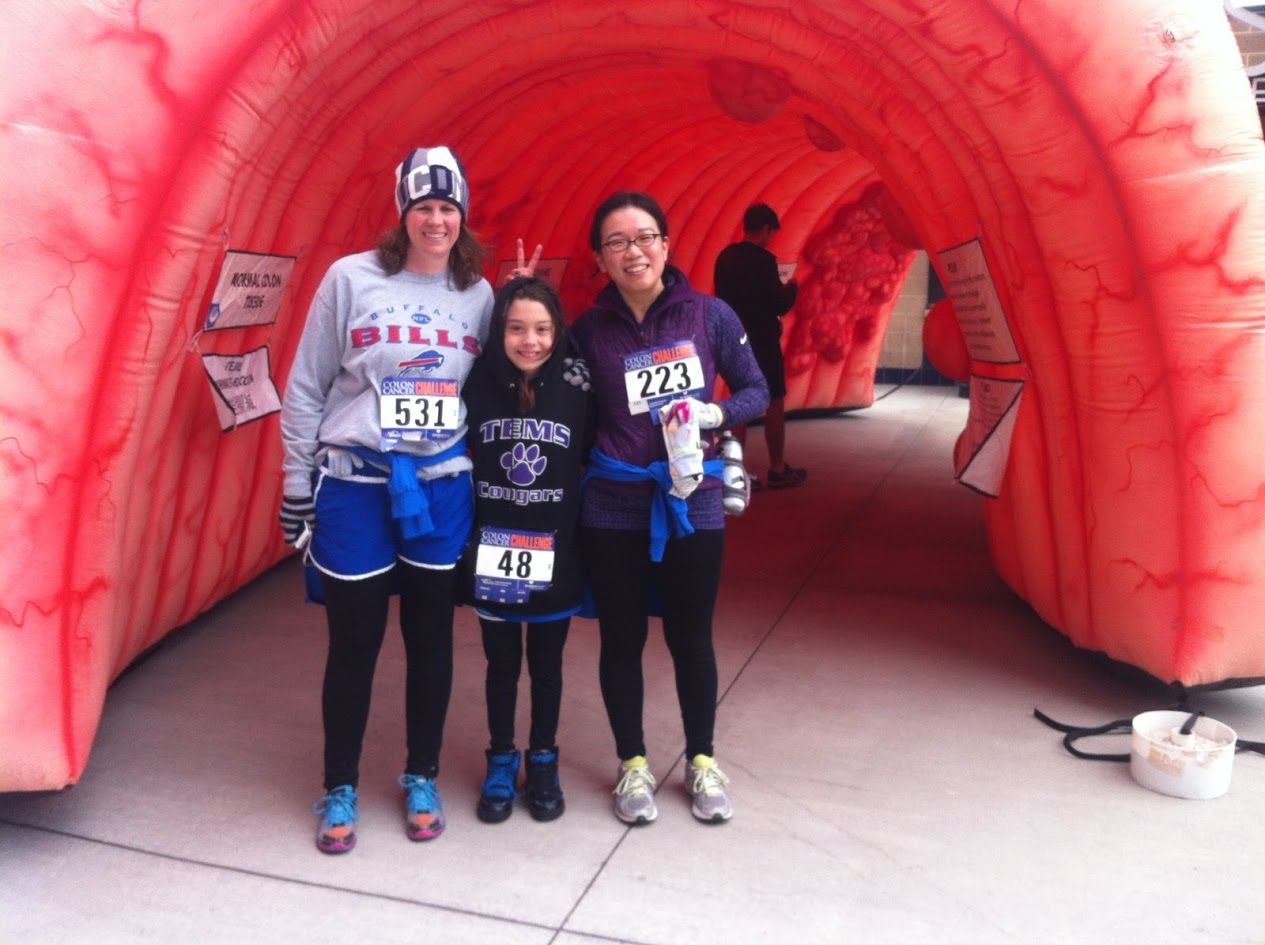
Since 2015, Cindy Chen has played a formative role in various technical initiatives surrounding research at WCM, but her journey to ITS is an interesting one. Now the Assistant Director for Clinical & Translational Services, see how Cindy incorporates her passion for medical research at both work and in her personal life.
I am currently the Assistant Director for Clinical and Translational Services in Research Informatics. This is a new section that was created in May of last year, and it really deals with transactional applications, dealing with the conduct of research as compared to the Data Science Service section, which is about the analytics of research data.
Correct. I actually started at Weill Cornell as a project manager, and then became the PMO Manager for what is called the “mission side,” supporting divisions like Ed Tech, Research, Informatics, Research Administrative Computing (RAC), and Scientific Computing.
Yes, I've had a curious career, I suppose. I finished grad school and moved here in late September/early October of 2001. My dream of joining a place like Penguin Random House and becoming a copy editor didn't quite pan out, but the closest I got was a job in medical communications. That got me on this path where I started working on medical communications and medical textbooks, STM [science, technology, and medicine] publishing.
So, I started back then when books were still paper and there were blues and galleys! Then, as time progressed it became more and more digital. There was website content, developing e-books, apps for gen. 1 of iPads. I moved from editorial project manager to more of a technical project manager, and that's kind of how I got my foot in the door here.
I'd actually had a brief pit stop in the finance industry and realized very quickly I missed health care and medicine. I had worked before with pharmaceutical companies, which I know get a bad rep, but compared to finance, pharmaceutical companies are amazing!
I decided to then come back to health care and Cornell was a great fit.
Oh, that's a tough one, but I think one of the favorite parts I've had is how truly collegiate ITS is. Whenever Cornell talks about students, faculty, and staff, “staff” is kind of the last in line. But we’re collegiate in the sense that ITS leadership has always encouraged people to learn. We can say, “I have a hypothesis, I want to test this out. Can I do this project?” It's allowing that intellectual freedom that's been really amazing.
One kind of lead me into my current informatics role is when I started in 2015: research data repositories (RDRs). It was a hard sell for researchers. Tom Campion [Director of Research Informatics] was trying to convince some researchers the value of using electronic health care records, a secondary usage of EHR data to do research. Fast forward to now, there are a dozen RDRs and more requests than the RI team can handle. I was the project manager for the very first one that successfully closed and implemented that kind of set the model for future RDRs.
The second one is biobanking. A lot of other peer institutions have a centralized biorepository core so that each researcher doesn't have to have their own freezers for specimens or blood, or things like that. Especially in New York City, space is at a premium, so there's been a long-term effort to centralize and coordinate that into the institutional biorepository core. And in 2016-2017, I was the PM for the RFI RFP process to help get that going from a technology point of view. Now the IBC [Institutional Biorepository Core] and supports over a dozen studies.
The last is the JCTO wanted to implement electronic informed consent in six months from start to finish.
I was the PM for it and worked very closely with Scott Brown in RAC. We just basically put our heads to get heads down for six months and churned something out as a homegrown eConsent offering. I actually wrote a paper about it with Tom Campion and it's published, so I guess I’m a published author!
I’ve written three papers, one was with Dr. [Curtis] Cole. It’s a systemic review on e-consent. Because I was a PM for e-consent, it was so interesting to me because this was also around the time when The Immortal Life of Henrietta Lacks came out. What did it mean to give consent to do research? How do we stop another Henrietta Lacks situation or the horrible Tuskegee syphilis studies?
We’re now working on an expansion for e-consent. There's an out-of-box e-consent module in REDCap. We’re migrating from our homegrown version to the formal out-of-box version. The pandemic kind of accelerated the timeline and interest in e-consent. It was already steadily growing, but going remote made remote consent really popular.
I think by now I'm accustomed to it. At first, I was a bit lucky that the PMO already had a hybrid work policy, so it wasn’t completely foreign to me. When peak pandemic hit, it was scary and I was very aware that I was privileged to be able to work safely from home, and as an introvert, I didn't mind it. But now two years in, it is wearing a bit.
I do miss the coffee talk, you know, running into people in the pantry and getting to know the people you work with as humans rather than, “Oh, if you need an email, go to Vanessa,” rather than “Hey, do you know Vanessa really likes bubble tea?” and we can talk about that. You know, making people three-dimensional rather than one dimensional, which I feel we lack. It's harder to mimic.
Well, my pandemic hobby that I picked up was bicycling. Thanks to Phil Lamont’s [another project manager] suggestion, I bought a Brompton folding bike, and surprised myself that I really enjoyed it. Obviously, it was ideal to be bicycling in 2020 when there's nobody in the city and the roads were fairly empty. Fast forward two years and kids on tricycles are passing me!
I’m a huge sci-fi nerd – live long and prosper. Huge Star Trek fan. I consume more media than I create, so I watch a lot of movies. I'm part of two different book clubs, so lots of reading.
I also do volunteer work. This January, I was appointed to the Board of the Colon Cancer Foundation.
Thanks! I’ve been a long-time volunteer with the Colon Cancer Foundation and now I’m a board member. I’m trying to help it grow and recover from the setback of the last two years.
Actually, March 27 is our Colon Cancer Foundation 5K Challenge in Queens. People can join a team or donate. There’s also an inflatable colon, which is my favorite thing! Instead of a bouncy house... it’s an inflatable colon with the various stages of colon cancer.

Cindy Chen (far right) with friends at the Rollin’ Colon, a state-of-the-art 20-foot inflatable reproduction of the human colon. The walk-through educational exhibit has been created to inform the public about the signs and symptoms of colorectal cancer, as well as the other diseases of the colon. You can donate to Cindy’s fundraising team, Aw Crap!, to support colon cancer research.
I admire the usual suspects: RBG, Rosa Parks, Hillary Rodham Clinton – all of these magnificent, well-known figures.
But on a more personal level, I admire my grandmother on my mom’s side. She had a challenging family dynamic in life, but she never lost her joie de vivre. She was always laughing and she wasn't afraid to show the sad side and cry as well. In hindsight, now I think it’s very brave.
The second person would be my high school English teacher. There were rumors about her sexuality, and this was the early 90s. We weren't as aware of LGBTQI issues then. High school is tough, and she handled it with aplomb and her classroom became a safe space for any of the outsider or weird kids, regardless of your sexuality or gender identity. She handled it with so much grace and I don’t know how she did, especially in the climate of the 80s and 90s.
I’m also in her book club.
It's really intimidating to be in a book club with your high school English teacher.
That's an academic paper, not “Tell me more about this close reading of this Pulitzer Prize-winning novel”! Uh, I don’t know! I thought we were reading this for fun!